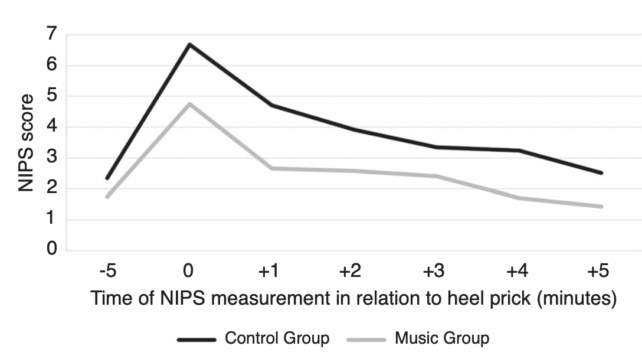Babies that are about to get poked by doctors may benefit from the lullabies of Mozart.
A recent randomized, blinded control trial has found that calming background music during minor medical procedures can somewhat alleviate signs of pain in newborns.
The trial is the first of its kind according to a team from Thomas Jefferson University in Philadelphia, who worked with doctors to conduct the research among 100 infants at a community hospital in the Bronx, New York.
Each baby was born at full term and was about 2 days old during the trial.
Before having blood taken by a medical professiona through a standard heel prick procedure, just over half of the infants were played a soothing, instrumental lullaby by the famous musician Mozart for twenty minutes. The other half waited in silence.
Typically, when newborns are about to undergo a minor painful procedure, they are given a small dose of sugar as a balm.
Two minutes before the heel prick, all babies were given sucrose to alleviate their pain slightly.
The lullaby played throughout the heel prick and continued for about five minutes after. Parents were not allowed to physically cuddle their babies during the trial.
An investigator regularly scored the infants' pain, using facial expressions, crying, breathing patterns, limb movements, and alertness as indicators. The investigator wore noise-canceling headphones, so they weren't aware if music was playing or not.
Ultimately, the newborns who were exposed to Mozart showed "a statistically and clinically significant" reduction in scores on the Neonatal Infant Pain Scale (NIPS), and this was true before, during, and after the heel prick.

The authors conclude "music intervention is an easy, reproducible, and inexpensive tool for pain relief from minor procedures in healthy, term newborns."
Today, there is considerable evidence to suggest music can significantly reduce pain perception among adults, and yet it's not clear how song achieves this incredible feat or whether it's innate or learned.
Studies among newborns are a good opportunity to explore further, especially since pain medication is often not an option for this group.
In 2017, scientists found when oral sucrose was combined with music therapy in premature newborns, there was greater pain relief during the heel prick test.
Premature newborns, however, are not the best study group. They are often exposed to pain during their stay in intensive care units, which means they might have an altered perception and physical response to the sensation.
The recent trial from the Bronx is the first to study babies born at full term.
The findings suggest that some types of calming music can have a powerfully soothing effect on even the youngest human brains.
This could be a result of the music distracting the babies from their pain. But previous studies among adults have shown that lively, enjoyable music alleviates pain more than somber and sad music. And that means distraction can't fully explain the results.
Perhaps there's something in the tempo, harmony, or melody of a song that holds some sort of pain relief for the human brain, even if it's heard very little music before.
The current trial did not compare different types of music and their pain-relieving effects, factors that could be explored in future research.
The scientists who worked on the current trial say they are now interested in whether parental voices could be equally as soothing to newborns as Mozart.
The study was published in Nature.
